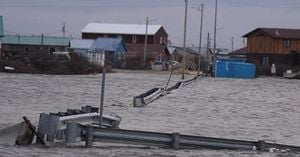Recent studies have illuminated a shocking reality: dolphins are inadvertently inhaling microplastics, microscopic plastic particles resulting from the degradation of larger plastic waste. Despite the cleverness and adaptability of these marine mammals, researchers have discovered traces of microplastics not only within their bodies but now also within their exhaled breath.
This groundbreaking finding highlights the expansive reach of plastic pollution, entering realms we might not typically associate with such contaminants. The research published earlier this month sheds new light on how these small yet harmful particles, ubiquitous across our planet, are finding their way even to the lungs of oceanic creatures.
According to the study published by PLOS One, dolphins from regions like Sarasota Bay, Florida, and Barataria Bay, Louisiana, were found to exhale microplastic fibers. The authors of this research emphasized how alarming it is to find these pollutants not just confined to ocean depths or marine sediments, but literally being inhaled and exhaled by these intelligent marine mammals.
Leslie B. Hart, one of the lead researchers and co-director at the Center for Coastal Environmental and Human Health at the College of Charleston, reported, "This really highlights how polluting plastic is. We have plastic everywhere. There’s really no safe place to get away from it." This perspective leads to significant concerns about dolphin health and the overall impact of microplastics on marine life.
Microplastics are formed as larger pieces of plastic break down due to environmental factors—sunlight, wind, and ocean currents contribute to this degradation process. Surprisingly, around eight million pieces of plastic are dumped daily in oceans worldwide, resulting in approximately 358 trillion microplastic particles affecting marine ecosystems. Research indicates 80% of the debris found on ocean surfaces is plastic, largely from sources like discarded fishing nets and waste.
The study revealed startling data—the researchers collected samples from the dolphins and found every sample contained at least one type of suspected microplastic particle. This raises alarm, especially considering the grave health risks associated with inhaling these particles. Previous human studies link microplastic inhalation to conditions such as oxidative stress and inflammation, symptoms which could similarly manifest within dolphin populations.
The ocean is, perhaps ironically, also contributing to the airborne spread of these harmful particles. It's estimated oceans release around 100,000 metric tons of microplastics back to the atmosphere annually, which then gets transported by winds. This means even dolphins swimming off rural coasts are at risk of encountering microplastics.
.Microplastics are worrisome not just for their physical presence but also for the chemicals they carry. These substances can disrupt biological processes, affecting reproduction and neurological function, issues already evidenced by detrimental impacts on humans. Given the biological similarities between dolphins and humans, it's plausible to infer dolphins could experience similar health complications.
The research teams emphasized additional studies are necessary to fully outline the effects of microplastic inhalation on dolphins' health and determine the threshold levels of exposure considered dangerous. The risk is heightened due to dolphins’ unique lung capacity; their need to take deep breaths makes them susceptible to air pollutants. Coupled with their role as apex predators, the fate of dolphin populations can reflect the overall health of marine ecosystems.
While scientists continue to study and address the impact of environmental plastic on marine life, solutions are available at both individual and collective levels. Reducing plastic usage, improving waste management practices, and advocating for stronger regulations around plastic production and disposal are key strategies to mitigate the problem.
Interestingly, these findings align with broader trends identifying microplastics within various organisms, including humans. They have been detected in human lung tissue and have raised concerns about the prevalence of microplastics across the food chain. Dolphins, being top predators, encapsulate the concerns about toxic pollutants moving through marine ecosystems and affecting both wildlife and human populations.
The connection dolphins represent is significant; they act as indicators of ocean health, and their struggles can foreshadow challenges humans may face. "We may find more information about what these exposures can mean for humans by studying marine mammals," explained Leslie Hart.
The pervasive nature of microplastics brings urgent attention to the ecological disaster looming beneath the surface. With continued pressure from pollution, including plastic waste, action must be taken to safeguard our oceans and the myriad of life forms relying on their health. More extensive research is on the horizon, as experts aim to unravel the complete impact of microplastics on marine ecosystems and the alarmingly intertwined fates of dolphins and human beings.



